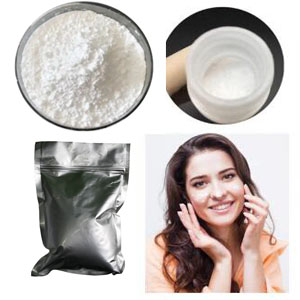Dipeptide-6:A New Path to Smoother Skin

Dipeptide-6 is a short-chain peptide increasingly used in modern skincare for its role in stimulating natural skin regeneration and supporting dermal health. As a synthetic molecule inspired by naturally occurring peptides, Dipeptide-6 has attracted attention for its ability to influence key cellular processes without irritating the skin. Its compact structure allows it to interact efficiently with skin receptors, promoting a more youthful and resilient complexion.
Understanding the Structure and Role of Dipeptide-6
Dipeptide-6 consists of two amino acids linked by a peptide bond. This small size is crucial for quick skin absorption and efficient bioactivity. While the exact sequence can vary depending on the application, it typically mimics fragments of growth factors or signaling peptides that exist naturally in the skin.
Signal Peptides and Skin Communication
In skincare, Dipeptide-6 often acts as a messenger peptide. It communicates with skin cells such as fibroblasts, encouraging them to produce more collagen, elastin, and other extracellular matrix proteins essential for firmness and elasticity.
Skin Renewal Support
This peptide is particularly helpful in supporting cell turnover and regeneration. By enhancing the skin's natural renewal processes, Dipeptide-6 contributes to smoother texture, better tone, and overall healthier-looking skin.
Cosmetic Applications of Dipeptide-6
Dipeptide-6 is found in formulations aimed at anti-aging, barrier repair, and post-procedure care. Its well-tolerated profile makes it suitable for daily use across all skin types, including sensitive and reactive skin.
Anti-Aging Serums and Creams
When incorporated into serums and moisturizers, Dipeptide-6 helps improve skin density and reduce fine lines by promoting collagen synthesis. Products containing this peptide often focus on restoring volume and increasing elasticity.
Recovery and Redness Reduction
Due to its soothing and regenerative properties, Dipeptide-6 is also effective in calming irritated or stressed skin. It supports healing after exfoliation, laser treatments, or other dermatological procedures.
Scientific Backing and Safety Considerations
Dipeptide-6 is backed by laboratory research indicating its ability to stimulate fibroblast activity and boost dermal protein production. These effects are achieved without triggering inflammation or disrupting the skin’s protective barrier.
Dermatological Testing
Clinical studies confirm that Dipeptide-6 is non-sensitizing and safe for prolonged use. Its compatibility with common skincare actives makes it a versatile addition to both simple and complex formulations.
Formulation Flexibility
This peptide performs well in emulsions, gels, and aqueous serums. It remains stable under a broad pH range, allowing formulators to pair it with acids, vitamins, or lipids for enhanced multi-functional performance.
Consumer Appeal and Future Trends
With growing consumer interest in ingredient transparency and science-driven beauty, Dipeptide-6 offers a credible and efficient option for users seeking noticeable skin improvements. Its minimalist profile aligns with clean beauty trends without compromising effectiveness.
Customizable Peptide Combinations
Many brands now use Dipeptide-6 in combination with other peptides to target multiple skin concerns in a single formula. These complexes allow users to experience broader benefits like hydration, barrier support, and brightening all at once.
Innovation in Skincare Delivery
Ongoing research is focused on incorporating Dipeptide-6 into advanced delivery systems such as microencapsulation and nanoemulsions, which can further enhance absorption and efficacy while protecting the peptide from degradation.
